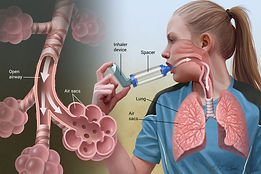
Know how to respond to common medical conditions
Asthma
Inflammation of the small tubes called the bronchi.
You are more likely to develop asthma if you have a family history of the condition.
-
Coughing
-
Wheezing
-
Shortness of breath
-
Tightness in the chest
-
Stop activity and sit them down
-
Reassure the patient, stay calm, keep them relaxed
-
Encourage them to take slow, steady breaths
-
Inhaler – they should take this themselves
-
Emergency services (if needed)
-
Some patients take steroid tablets (if prescribed), they will need these if this is the case.
Type 1 Diabetes
The pancreas doesn't produce any insulin. Type 1 diabetes are usually diagnosed early on in a person’s life and is usually genetic.
-
feeling very thirsty
-
urinating more frequently than usual, particularly at night
-
feeling very tired
-
weight loss and loss of muscle bulk
-
blurred vision
-
slow healing of cuts and grazes
-
Changing lifestyle – improvements in diet and exercise, losing weight.
-
Usually controlled with tablets but if not successful they may also need insulin.
-
If blood sugar is too low, person will show signs of sweating, shaking, feelings of weakness and may appear confused. This is called hypoglycaemia. Treatment = give person fast acting sugars e.g. sugary drinks.
Type 2 Diabetes
Occurs when the body doesn't produce enough insulin to function properly, or the body’s cells don't react to insulin. Usually occurs later in life with aging. Other risk factors are genetics, being overweight and ethnicity
-
feeling very thirsty
-
urinating more frequently than usual, particularly at night
-
feeling very tired
-
weight loss and loss of muscle bulk
-
blurred vision
-
slow healing of cuts and grazes
-
Changing lifestyle – improvements in diet and exercise, losing weight.
-
Usually controlled with tablets but if not successful they may also need insulin.
-
If blood sugar is too low, person will show signs of sweating, shaking, feelings of weakness and may appear confused. This is called hypoglycaemia. Treatment = give person fast acting sugars e.g. sugary drinks.
Epilepsy
Associated with damage to the brain.
Some cases of epilepsy may be caused by changes in the brain that occur as a result of the genes you inherit from your parents.
-
Tingling sensations / pins and needles
-
Sudden muscle stiffness
-
Seizures
-
Loss of senses
-
Blurred vision
-
Loss of consciousness
-
Not remembering/unable to communicate/blank staring/ unaware of surroundings
-
Foaming at mouth
-
Headaches
-
Call the emergency services
-
Move objects to ensure the person is kept from harm. Keep them safe
-
Give them their medication
-
Keep them warm
-
When the fit has finished, put them in the recovery position.


